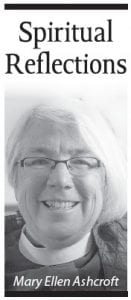The resurrection? The authority of scripture? Is there some checklist, like a gear list before embarking on a canoe trip? (Tent—check; Trinity—check; rain gear— check; the return of Christ— check.) Do we need to assent to certain beliefs before we go to church? Is there an optional list—binoculars? The virgin birth?
People say to me, “Well I’m not Christian,” or “I don’t believe in God.” Sometimes they say it as full disclosure: “Since I’m here in church you need to know this.” Others say it as the reason they don’t go to church. Usually I respond, “Not to worry, I’m sure that there are many in church struggling to believe today.” Or “tell me more about the God you don’t believe in….I may not believe in that one either.”
Then it struck me— have we gotten this all wrong? Where did we get the impression that we need to believe to go to church? Maybe instead, we need to go to church to believe.
Why should going to church be about belief anyway? I suspect that most people who start going to AA don’t go because they believe in the Twelve Steps. They go with a sense of openness (or desperation), and then they “come to believe.”
Maybe the belief as prerequisite idea comes from our slavery to a modernism, which assumes anything must be filtered through the rational mind to be valid. Even though most of us know that most of what really matters is not knowable through reason at all.
What role does believing play in closeness to the divine? One vignette In Matthew’s gospel shows some chief priests and elders trying to trick Jesus. These religious leaders—surely believers with a capital B— were shocked when Jesus said to them, “You know, tax collectors and prostitutes are going into the kingdom of God before you.” Jesus doesn’t seem to think entering the Kingdom of God is about belief.
What do tax collectors and prostitutes have that the chief priests and elders don’t? What is getting them into the Kingdom of God when the religious leaders are left banging on the door?
Vulnerability. Openness. Humility. Doubt about the religious status quo. Hope for more.
Maybe these are all any of us needs to go to church.
When you think about it, we don’t require children to have a certain belief system in place before they come to church. In many sacramental churches today, little ones are given Eucharist. People worry—do they understand this sacrament? My response—do any of us understand it?
It is in the gaps, the places where we side step the rational, that we are more likely to encounter the divine—in the music, the bread received, the loving touch—not by subscribing to some creedal statement, but through experience.
A naturalist friend told me what she does when a 10-year-old boy sees a bug and wants to squash it. She says, “Just a minute. Let’s watch it…” The child watches, gets interested in the bug. Maybe he won’t squash it. Maybe he’d like to learn more about bugs!
Could this be true of our spiritual journeys? When people say to me, “Well I’m not Christian,” or “I don’t believe in God,” I should say, “Just a minute. Let’s watch for a while and see.. .”
What do you need to believe to go to church? Let’s drop the belief question and say, come and see. Bring your vulnerability, your doubts about the religious status quo, your hope for more. Bring your conviction that much that really matters is not knowable through the rational mind. Come with an open heart. You may come to believe.
Each month a member of the Cook County Ministerium will offer Spiritual Reflections. This month’s contributor is Mary Ellen Ashcroft, Vicar of Spirit of the Wilderness Episcopal Church.



Loading Comments